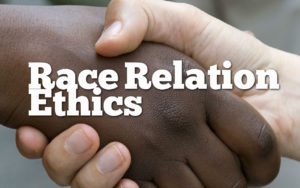Ethics is not about taking the easy road, but rather about taking the right road. At this moment our country is reeling. Black on white, white on black; there is finger pointing everywhere. There is fear. Violence erupts, and God help us, there is serious injury and death. Now is the time to interject an intelligent dialogue into race relation ethics.
 On all sides, within each side, messages are blared to us and at us by a collection of activists, politicians, social media gurus, law enforcement officials, community leaders and “personalities” ranging from actors to musicians to media talking heads who have made their living off of racial tension. It seems that many of them have no real concern over race relation ethics. Rather, they vie for attention for self-promotion.
On all sides, within each side, messages are blared to us and at us by a collection of activists, politicians, social media gurus, law enforcement officials, community leaders and “personalities” ranging from actors to musicians to media talking heads who have made their living off of racial tension. It seems that many of them have no real concern over race relation ethics. Rather, they vie for attention for self-promotion.
Within our struggles to be heard and to have others hear us, we have grown more wary of one another, less trusting, more disdainful and ever angrier. We are not talking to each other anymore, heck, we are fearful of even looking at each other, we are divided. We think we don’t know what to do, but the answer is in front of us.
Things are lousy to be sure, but there are those on all sides, within each side, who are stirring an angry and vicious pot for their own “amusement.” I do not use “amusement” as in Comedy Club, but as puppeteers playing a game with everyone’s emotions. Those people win when tensions rise. If things are lousy, they are making them lousier. Heated rhetoric provides an example of race relation ethics applied in a clearly negative way. Perhaps it’s best to call it out – it is not at all race relation ethics.
In that group of pot stirrers, there are few, if any, willing to take a neutral and ethical stance; to ask, without question of color, what is the right thing and the right course. No one is asking what we would have to do to cultivate an atmosphere that at least approaches healing.
Ethical behavior is nothing other than what it is. Ethics is blind. We must start to do what is ethical, not what makes us feel good. Here is the problem: in order to let ethics work so that ethics is blind, we must all take our blinders off.
Hear me, I am a Person
I believe with all my heart that there exists a majority of Americans of all races who are willing to talk openly to each other without rhetoric. It will not be easy to do this, but ethically we can make it happen, one conversation at a time. We can be angry as hell and still be civil. Who should lead these discussions? My opinion is that these conversations are not political or media-driven, they are ethical and best shared one to one.
So that I am not accused of being like a Pollyanna, I also believe there are smaller groups on all sides so invested in their agendas that it will take decades for their hearts to soften. We cannot allow a relative handful of people so invested in their close-mindedness to make it impossible for more rationally thinking people to come together.
We do not need more town hall meetings, forums, conventions or speech making. We need acceptance of one another within the framework of ethical behavior. We need to ask ourselves what is right, versus: this is what I think I should say.
Can we come together and attempt to heal our divides?
Yes, but it will take an important exercise: we must be willing to stop talking and to start listening. Forgive me for being so blunt, but try to just shut up and open your heart. We must become our own judge and to fairly balance the scale and to realize we all have bias. Be open to accepting. It is what ethics demands of us. Also, don’t preach or talk down to anyone. We live in an age where we have far too many preachers, and not enough congregants!
If a person tells you she has been discriminated against, believe her and understand how it shaped her and how it would shape you were the tables reversed. This is the foundation of race relation ethics.
If you categorically view a person as “privileged’ and he tells you his father worked 16 hours a day, six days a week, to get a business off the ground, respect such sacrifice as well. Success is not automatic.
Each one of us filters things through our own experience. It is wrong to dismiss someone else’s experience because we have not lived through it.
None of this caring stuff is easy, but what is the alternative to trying and trying again? Ethically, nothing.
YOUR COMMENTS ARE WELCOME!


